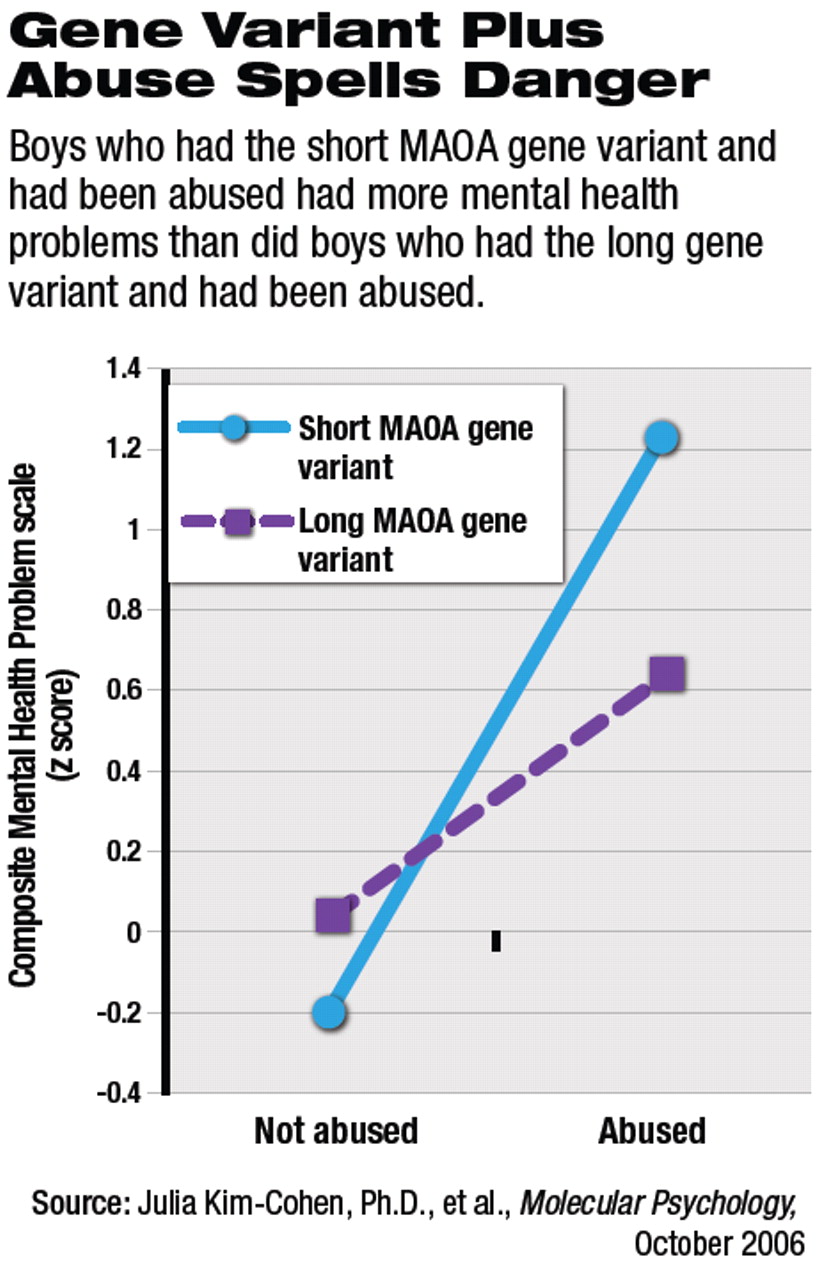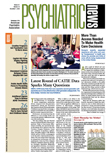For four years, the case has been building that a short variant of the monoamine oxidase a (MAOA) gene, when combined with harsh discipline, physical abuse, or other forms of maltreatment, puts youngsters at risk for antisocial behavior.
In 2002, Avshalom Caspi, Ph.D., of the Institute of Psychiatry in London and his coworkers were the first to report such a connection in a sample of more than 400 young men who had been followed since childhood. In 2004, Debra Foley, Ph.D., an assistant professor of human genetics at Virginia Commonwealth University, and colleagues reported that they had made the same association in youth aged 8 to 17 (Psychiatric News, September 3, 2004). And now Julia Kim-Cohen, Ph.D., an assistant professor of psychology at Yale University, and her team have reported the association once again, but in 7-year-old children. They published their findings in the October Molecular Psychiatry.
This latest inquiry included 975 boys. At ages 5 and 7, the boys had DNA samples taken and were assessed for physical mal-treatment, such as fractures, dislocations, or being burned with matches. The scientists then looked to see whether boys who had been physically abused and possessed the short variant of the MAOA gene (16 subjects) had significantly greater mental health problems than did boys who had been physically abused and possessed the long variant of the gene (46 subjects). This turned out to be the case.
The researchers then classified the mental health problems into emotional difficulties, antisocial behavior, or attention and hyperactivity difficulties. Again they found that children who possessed the short MAOA gene version and who had been exposed to physical abuse had more emotional problems, more antisocial behavior, and more attention and hyperactivity difficulties than did those children with the long gene version who had been abused. However, only the attention-hyperactivity results yielded a clear statistical significance.
Meta-Analysis Increasingly Valuable
Finally, the researchers conducted a meta-analysis of published findings on the subject. “Meta-analysis,” they noted, “is an increasingly valuable method in the field of psychiatric genetics, which in recent years has been plagued by nonreplications, leaving questions about gene effects on behavior in doubt. By pooling data from several studies, meta-analysis maximizes power to detect effects and avoids overemphasizing estimates from any one study.”
The meta-analysis demonstrated that, across studies, the association between childhood maltreatment and mental health problems was significantly stronger in the group of males with the short gene variant than in the group with the long one. Also, it found a statistically significant interaction between the short variant and maltreatment in predicting antisocial behavior.
Thus, in view of their study, and especially in view of their meta-analysis, Kim-Cohen and her group concluded that when the short MAOA gene variant is combined with maltreatment, it can put youth on the path toward antisocial behavior.
What Mechanism Is at Work?
But how might this combination do so? The MAOA enzyme is known to metabolize neurotransmitters involved in stress regulation, Kim-Cohen explained to Psychiatric News. As a result, the short MAOA gene variant may make children vulnerable to any maltreatment they experience. This particular sensitivity might then spark anxiety, hyperactivity, impulsivity, aggression, or other signs that a child feels besieged. And these mental and behavioral perturbations in turn could set the stage for antisocial behavior.
So what can be done to halt this undesirable trajectory? One possibility, the researchers suggested, might be to treat at-risk youth with medications. Another might be to provide such youth with social support. In a recent inquiry, social support was found to reduce depression in children who were both genetically vulnerable to depression and maltreated.
But before such strategies could be deployed, the at-risk youth would have to be identified via genetic screening, and “targeting preventive interventions for antisocial behavior based on a single genotype is unlikely to become a wise or fruitful policy,” Kim-Cohen acknowledged, because“ complex behaviors like antisocial behavior have multiple causes, and we are only beginning to identify possible genetic contributions to this web of interactions.”
Still another drawback of screening youngsters for the short MAOA gene variant, Paul Appelbaum, M.D., chair of APA's Council on Psychiatry and Law, pointed out recently, is that it might create “a class of kids who are labeled as high risk for violence. That can have really untold consequences, ranging from negative decisions about placement [to] effects on self-image and behavior.” Nonetheless, he noted, “If effective treatment becomes available, the pressure to identify [at-risk individuals] through screening at birth may be irresistible” (Psychiatric News, November 3).
This latest study and the meta-analysis were funded by the National Institute of Mental Health, the UK Medical Research Council, and the ESRC-SCOPIC Network.
An abstract of “MAOA, Maltreatment, and Gene-Environment Interaction Predicting Children's Mental Health: New Evidence and a Meta-Analysis” is posted at<www.nature.com/mp/journal/v11/n10/abs/4001851a.html>.▪

